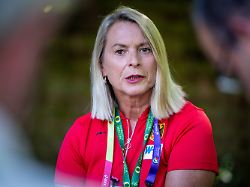The German Athletics Association announces the first consequences of the medalless World Cup in Budapest: head coach Annett Stein is relieved of her duties. However, there are great doubts surrounding the DLV as to whether small changes are enough to solve huge problems.
The bitter days of Budapest still have an impact. At the 19th World Athletics Championships, the German Athletics Association team remained without a medal for the first time, which was tantamount to a debacle. On an individual level, many athletes showed strong performances, but overall it was clear: the DLV has lost touch with the world’s best. What the association stated bluntly in Hungary, driven in the analysis by sports director Jörg Bügner, who was only hired in March of this year. Who is now gaining “significant” influence in the DLV.
Because head coach Annett Stein has been disempowered. The association announced this as one of the first results of its annual meeting in Darmstadt, with the official announcement focusing on the fact that “in the future, the senior national coaches would report directly to sports director Jörg Bügner”. With Stein, on the other hand, “discussions are currently being held about her future tasks at the DLV” – although she has not been able to recommend herself for similarly responsible roles since she was promoted to head coach in 2019.
Meanwhile, Idriss Gonschinska, the DLV board chairman and the association’s most important decision-maker for years, is increasingly becoming the focus of criticism. After his promotion from head coach to general director (also in 2019), he initially surprisingly appointed Alexander Stolpe as head coach, who then disappeared again after barely six months. He took up the job “with many laurels from Gonschinska,” she writes “Southgerman newspaper”, without being able to prove the doubts about his suitability for his new tasks. Stein became his successor and the face of the decline. The 2022 World Cup in Eugene (two medals) already saw the worst record in DLV history to date, and in Budapest this negative record has been beaten again.
Ex-president calls for far-reaching consequences
Only: The fact that restructuring is now underway again, both in terms of personnel and structure, also calls into question Gonschinska’s ability to lead German athletics out of the crisis. “We are consistently driving forward structural change within the DLV,” Gonschinska is quoted in the statement in the finest manager speak: “We want to act faster, leaner and more horizontally, with fewer hierarchies.” The 54-year-old made himself scarce around the World Cup and was not seen or heard at all in Budapest.
It is sometimes said around the DLV team that Gonschinska prefers to appear in public when successes are to be celebrated. With regard to the disempowerment of Stein, the “Süddeutsche” sums up “that the problems have deeper roots than just one person [einzelnen; Anm.d.Red.] Management position”. Especially since “today’s DLV competitive sport can be described primarily as his work”, as the SZ had already judged in the conclusion of last year’s World Cup. Gonschinska was promoted to head coach in 2012, to sports performance director in 2016, and to general director in 2019. He is the decisive man in German athletics.
Clemens Prokop, long-time and now former DLV president, may have called for more far-reaching consequences. The association structures are “no longer sustainable if we want to generate world class with the conditions and structures of amateur sport”. It is urgent to check “whether our trainers and the head national coach have the necessary experience, competence and vision for the future”.
Reconstruction shortly before the Olympics highlights problems
The former head coach and sports director Jürgen Mallow had previously stated: “The causes [für die Krise; Anm.d.Red.] lie in the association, with those who are responsible for competitive sport.” This fits with the recurring stories of athletes who are sometimes satisfied if the DLV at least does not stand in the way of their performance development.
Restructuring in such a profound way less than a year before the Paris Olympic Games is a sign of massive problems. Especially since Bügner is now a man at the helm who only took up his position in March and repeatedly emphasized in Budapest that he was far from completing his familiarization with the association’s everyday life and its structures.
“Our goal is to further sharpen responsibilities,” Gonschinska is also quoted as saying. Whether this also affects his own position and power remains to be seen. At least the DLV has long since communicated its goal clearly and to the outside world: to be one of the top 5 athletics nations in the world again by the 2028 Olympics. In Budapest, Germany was not one of the 46 countries Medal table of this World Cup appeared.
